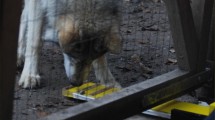Abstract
Self-control is defined as the ability or capacity to obtain an objectively more valuable outcome rather than an objectively less valuable outcome though tolerating a longer delay or a greater effort requirement (or both) in obtaining that more valuable outcome. A number of tests have been devised to assess self-control in non-human animals, including exchange tasks. In this study, three chimpanzees (Pan troglodytes) participated in a delay of gratification task that required food exchange as the behavioral response that reflected self-control. The chimpanzees were offered opportunities to inhibit eating and instead exchange a currently possessed food item for a different (and sometimes better) item, often needing to exchange several food items before obtaining the highest valued reward. We manipulated reward type, reward size, reward visibility, delay to exchange, and location of the highest valued reward in the sequence of exchange events to compare performance within the same individuals. The chimpanzees successfully traded until obtaining the best item in most cases, although there were individual differences among participants in some variations of the test. These results support the idea that self-control is robust in chimpanzees even in contexts in which they perhaps anticipate future rewards and sustain delay of gratification until they can obtain the ultimately most valuable item.




Similar content being viewed by others
References
Addessi E, Crescimbene L, Visalberghi E (2007) Do capuchin monkeys (Cebus apella) use tokens as symbols? Proc R Soc Lond 274:2579–2585
Addessi E, Crescimbene L, Visalberghi E (2008) Food and token quantity discrimination in capuchin monkeys (Cebus apella). Anim Cogn 11:275–282
Ainslie GW (1974) Impulse control in pigeons. J Exp Anal Behav 21:485–489
Anderson JR, Kuroshima H, Fujita K (2010) Delay of gratification in capuchin monkeys (Cebus apella) and squirrel monkeys (Saimiri sciureus). J Comp Psychol 124:205–210
Baumeister RF, Heatherton TF, Tice DM (1994) Losing control: how and why people fail at self-control. Academic Press, San Diego, CA
Beran MJ (2002) Maintenance of self-imposed delay of gratification by four chimpanzees (Pan troglodytes) and an orangutan (Pongo pygmaeus). J Gen Psychol 129:49–66
Beran MJ (2010) Chimpanzees (Pan troglodytes) accurately compare poured liquid quantities. Anim Cogn 13:641–649
Beran MJ (2012) Quantity judgments of auditory and visual stimuli by chimpanzees (Pan troglodytes). J Exp Psychol Anim Behav Proc 38:23–29
Beran MJ, Beran MM (2004) Chimpanzees remember the results of one-by-one addition of food items to sets over extended time periods. Psychol Sci 15:94–99
Beran MJ, Evans TA (2006) Maintenance of delay of gratification by four chimpanzees (Pan troglodytes): the effects of delayed reward visibility, experimenter presence, and extended delay intervals. Behav Proc 73:315–324
Beran MJ, Evans TA (2012) Language-trained chimpanzees (Pan troglodytes) delay gratification by choosing token exchange over immediate reward consumption. Am J Primatol 74:864–870
Beran MJ, Savage-Rumbaugh ES, Pate JL, Rumbaugh DM (1999) Delay of gratification in chimpanzees (Pan troglodytes). Dev Psychobiol 34:119–127
Beran MJ, Evans TA, Hoyle D (2011) Numerical judgments by chimpanzees (Pan troglodytes) in a token economy. J Exp Psychol Anim Behav Proc 37:165–174
Berns GS, Laibson D, Loewenstein G (2007) Intertemporal choice-toward an integrative framework. Trends Cogn Sci 11:482–488
Bourjade M, Thierry B, Call J, Dufour V (2012) Are monkeys able to plan for future exchange? Anim Cogn 15:783–795
Boysen ST, Berntson GG (1995) Responses to quantity: perceptual versus cognitive mechanisms in chimpanzees (Pan troglodytes). J Exp Psychol Anim Behav Proc 21:82–86
Brosnan SF, Beran MJ (2009) Trade between conspecifics in chimpanzees (Pan troglodytes). J Comp Psychol 123:181–194
Brosnan SF, de Waal FBM (2003) Monkeys reject unequal pay. Nature 425:297–299
Brosnan SF, de Waal FBM (2004) Socially learned preferences for differentially rewarded tokens in the brown capuchin monkey (Cebus apella). J Comp Psychol 118:133–139
Drapier M, Chauvin C, Dufour V, Uhlrich P, Thierry B (2005) Food-exchange with humans in brown capuchin monkeys. Primates 46:241–248
Dufour V, Pelé M, Sterck EHM, Thierry B (2007) Chimpanzee (Pan troglodytes) anticipation of food return: coping with waiting time in an exchange task. J Comp Psychol 121:145–155
Dufour V, Wascher CAF, Braun A, Miller R, Bugnyar T (2012) Corvids can decide if a future exchange is worth waiting for. Biol Lett 8:201–204
Evans TA, Beran MJ (2007a) Chimpanzees use self-distraction to cope with impulsivity. Biol Lett 3:599–602
Evans TA, Beran MJ (2007b) Delay of gratification and delay maintenance by rhesus macaques (Macaca mulatta). J Gen Psychol 134:199–216
Evans TA, Beran MJ, Paglieri F, Addessi E (2012) Delaying gratification for food and tokens in capuchin monkeys (Cebus apella) and chimpanzees (Pan troglodytes): when quantity is salient, symbolic stimuli do not improve performance. Anim Cogn 15:539–548
Grosch J, Neuringer A (1981) Self-control in pigeons under the Mischel paradigm. J Exp Anal Behav 35:3–21
Hackenberg TD, Vaidya M (2003) Determinants of pigeons’ choices in token-based self-control procedures. J Exp Anal Behav 79:207–218
Hillemann F, Bugnyar T, Kotrschal K, Wascher CAF (2014) Waiting for better, not for more: corvids respond to quality in two delay maintenance tasks. Anim Behav 90:1–10
Jackson K, Hackenberg TD (1996) Token reinforcement, choice, and self-control in pigeons. J Exp Anal Behav 66:29–49
Judge PG, Essler J (2013) Capuchin monkeys exercise self-control by choosing token exchange over an immediate reward. Int J Comp Psychol 26:256–266
Leonardi RJ, Vick SJ, Dufour V (2012) Waiting for more: the performance of domestic dogs (Canis familiaris) on exchange tasks. Anim Cogn 15:107–120
Logue AW (1988) Research on self-control: an integrating framework. Behav Brain Sci 11:665–709
Mischel W (2014) The marshmallow test: mastering self-control. Little, Brown and Company, New York
Mischel W, Shoda Y, Peake PK (1988) The nature of adolescent competencies predicted by preschool delay of gratification. J Pers Soc Psychol 54:687–696
Moffitt TE, Arseneault L, Belsky D, Dickson N, Hancox RJ, Harrington H, … Caspi A (2011) A gradient of childhood self-control predicts health, wealth, and public safety. Proc Nat Acad Sci 108:2693–2698
Parrish AE, Beran MJ (2014a) When less is more: like humans, chimpanzees (Pan troglodytes) misperceive food amounts based on plate size. Anim Cogn 17:427–434
Parrish AE, Beran MJ (2014b) Chimpanzees sometimes see fuller as better: judgments of food quantities based on container size and fullness. Behav Proc 103:184–191
Parrish AE, Evans TE, Perdue BM, Beran MJ (2013) Chimpanzees (Pan troglodytes) transfer tokens repeatedly with a partner to accumulate rewards in a self-control task. Anim Cogn 16:627–636
Parrish AE, Perdue BM, Stromberg EE, Bania AE, Evans TA, Beran MJ (2014) Delay of gratification by orangutans (Pongo pygmaeus) in the accumulation task. J Comp Psychol 128:209–214
Pelé M, Dufour V, Micheletta J, Thierry B (2010a) Long-tailed macaques display unexpected waiting abilities in exchange tasks. Anim Cogn 13:263–271
Pelé M, Thierry B, Call J, Dufour V (2010b) Monkeys fail to reciprocate in an exchange task. Anim Cogn 13:745–751
Pelé M, Micheletta J, Uhlrich P, Thierry B, Dufour V (2011) Delay maintenance in tonkean macaques (Macaca tonkeana) and brown capuchin monkeys (Cebus apella). Int J Primatol 32:149–166
Rachlin H, Green L (1972) Commitment, choice and self-control. J Exp Anal Behav 17:15–22
Ramseyer A, Pelé M, Dufour V, Chauvin C, Thierry B (2006) Accepting loss: the temporal limits of reciprocity in brown capuchin monkeys. Proc Royal Soc London 273:179–184
Sayers K, Menzel CR (2012) Memory and foraging theory: chimpanzee utilization of optimality heuristics in the rank-order recovery of hidden foods. Anim Behav 84:795–803
Shoda Y, Mischel W, Peake PK (1990) Predicting adolescent cognitive and self-regulatory competencies from preschool delay of gratification: identifying diagnostic conditions. Dev Psychol 26:978–986
Steelandt S, Thierry B, Broihanne M, Dufour V (2012) The ability of children to delay gratification in an exchange task. Cogn 122:416–425
Stevens JR, Mühlhoff N (2012) Intertemporal choice in lemurs. Behav Proc 89:121–127
Stevens JR, Hallinan EV, Hauser MD (2005) The ecology and evolution of patience in two new world monkeys. Biol Letters 1:223–226
Stevens JR, Rosati AG, Heilbronner SR, Mühlhoff N (2011) Waiting for grapes: expectancy and delayed gratification in bonobos. Int J Comp Psychol 24:99–111
Tobin H, Chelonis JJ, Logue AW (1993) Choice in self-control paradigms using rats. Psychol Rec 43:441–454
Tobin H, Logue AW, Chelonis JJ, Ackerman KT, May JG (1996) Self-control in the monkey Macaca fascicularis. Anim Learn Behav 24:168–174
Acknowledgments
This research was supported by National Institutes of Health Grant HD060563, a 2CI Primate Social Cognition, Evolution & Behavior Fellowship and the Rumbaugh Fellowship from Georgia State University.
Author information
Authors and Affiliations
Corresponding author
Ethics declarations
Ethical standards
All aspects of this research conformed to APA standards for the ethical treatment of animals and followed the Institute of Science guidelines for ethical research with chimpanzees.
Conflict of interest
The authors declare that they have no conflicts of interest.
Rights and permissions
About this article
Cite this article
Beran, M.J., Rossettie, M.S. & Parrish, A.E. Trading up: chimpanzees (Pan troglodytes) show self-control through their exchange behavior. Anim Cogn 19, 109–121 (2016). https://doi.org/10.1007/s10071-015-0916-7
Received:
Revised:
Accepted:
Published:
Issue Date:
DOI: https://doi.org/10.1007/s10071-015-0916-7




